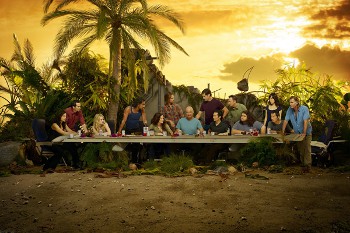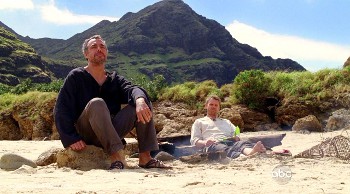Predictions on the Lost Finale
 With its last episode airing Sunday, I revisited my 2005 piece about Lost and was pleased that nothing in it embarrassed me – even though what the show has become would be incomprehensible to somebody who stopped watching way back then. Written a quarter the way through the second season, the essay is – in retrospect – too enthusiastic, but it’s also correctly cautious and (to be boastful) pretty perceptive.
With its last episode airing Sunday, I revisited my 2005 piece about Lost and was pleased that nothing in it embarrassed me – even though what the show has become would be incomprehensible to somebody who stopped watching way back then. Written a quarter the way through the second season, the essay is – in retrospect – too enthusiastic, but it’s also correctly cautious and (to be boastful) pretty perceptive.
Sure, I gave far too much credit to the scripts (“smart, detailed writing”), as Lost’s dialogue over six seasons has frequently been abysmally rote, and the series has returned far too often to the same wells (bad, bad Daddy). Yet Lost has remained conceptually brilliant and rigorous, and the result is a show that – while inconsistently good and only occasionally great (the fourth season’s “The Constant” remains its pinnacle) – has been thematically and narratively compelling throughout. (We must give some slack to something that totals 90 or so hours.)
And I think much of the essay remains relevant to the appeals and strengths of the entirety of Lost, and also to some of its problems. (“Great shows envisioned with tidy, finite story arcs often become unwieldy and bloated once they become profit centers.”)
I’m most happy with this observation:
“The writers have a prescient sense of when the audience’s interest in a particular person needs to get goosed, or when someone needs to be uprooted from the island and revitalized through the past.”
While this related specifically to the flashback structure, the core praise applies to the series as a whole, and its freewheeling approach to chronology and time to mix things up and break habits and expectations. The story-appropriate use of flash-forwards (in the fourth season, foreshadowed by Desmond’s premonitions of Charlie’s death), flash-sideways (in the final season), and time travel (in the fifth season, again foreshadowed by Desmond) reinvigorated Lost and kept it fresh. (These narrative approaches also, of course, made it impossible to describe the show to the uninitiated.)
I won’t be coy: I’m writing this almost exclusively to get more people to read my old essay. But in return, I’ll let you mock me. Toward that end … :
A Brief, Vague, and Surely Incorrect Prediction
 Un-Locke will succeed (or be at the point of inevitable success) in foiling every attempt to destroy him or keep him forever on the island. In the sideways world, however, it will be Locke whose actions (aided directly by Jack, and indirectly by Desmond’s collecting all the relevant Oceanic 815 passengers) stop his doppelgänger.
Un-Locke will succeed (or be at the point of inevitable success) in foiling every attempt to destroy him or keep him forever on the island. In the sideways world, however, it will be Locke whose actions (aided directly by Jack, and indirectly by Desmond’s collecting all the relevant Oceanic 815 passengers) stop his doppelgänger.
A Briefer, More-Concrete, and Surely More-Incorrect Prediction
Oh, what the hell: Locke, during surgery (performed by Jack, of course) to fix his back and restore his ability to walk, will – under anaesthesia but accessing some consciousness on the parallel-world island – kill Un-Locke and save said island.
Or maybe he’ll destroy the island. But it’ll happen during surgery. Maybe.
A Brief, Vague, and Surely Incorrect Prediction About Lost’s Inevitable “Surprise” Ending
Un-Locke/Man in Black will be revealed as ever-so-slightly more good/right than Jacob, even though his desire to escape the island was purely selfish.
This somewhat contradicts the previous predictions, in that the only way this can be shown is to let him off the island without any great calamity befalling mankind. But if I throw enough of these guesses out there, one of them is sure to be right. Right?
An Overreaching Summary of Themes
 The overriding conflict of Lost is between self-interest (initially, survival and being rescued) and the “greater good,” complicated by the fact that nobody really knows what the “greater good” is. The costuming of the white-clad Jacob and the Man in Black (and the aligning of people with those two demigod-ish figures) is a symbolic red herring, which John Locke of course articulated when describing backgammon to Walt in the first season: “Two sides. One is light. One is dark.” There is no moral judgment there.
The overriding conflict of Lost is between self-interest (initially, survival and being rescued) and the “greater good,” complicated by the fact that nobody really knows what the “greater good” is. The costuming of the white-clad Jacob and the Man in Black (and the aligning of people with those two demigod-ish figures) is a symbolic red herring, which John Locke of course articulated when describing backgammon to Walt in the first season: “Two sides. One is light. One is dark.” There is no moral judgment there.
The wretchedly executed backgrounder episode “Across the Sea” underscored the point: Jacob is acting both selfishly (the overseer of a game whose rules he wrote) and based on the instructions of his murderous “mother”; his brother just wants to get off the island, and must do so within Jacob’s (seemingly arbitrary) laws.
Perhaps that episode even clarified the primary conflict: The Oceanic 815 survivors, the Others, and the defected Widmore crew only understand the “greater good” in the context of Jacob’s and the Man in Black’s motives, yet “Across the Sea” offered abundant evidence that neither puppet master is, in any meaningful sense, “good” or righteous. (The current employees of Widmore – the third puppet master – are paid to believe what he believes, and his aims remain opaque.)
So I’m guessing that Sunday’s finale will emphasize that all the show’s main characters have been fools serving fools.
The problem for the characters is that on major issues they’ve been following directives, beliefs, and instincts that have never been proved to be valid. (We enter the numbers because we’ve been told we must enter the numbers.) We still have no sense of why the island must be protected, or why the Man in Black can’t be allowed to leave it, except that it would be like the cork being pulled out of the wine bottle.
The available evidence (the parallel narrative in which the island sits at the bottom of the sea) suggests that there is no reason to save the island; the sideways world doesn’t look significantly different from the world in which Oceanic 815 crashed. Yet nearly all Lost’s protagonists are aligned against the Un-Locke. Yes, the Man in Black has killed many a person, but how many more people have suffered and died because of Jacob’s claimed and heretofore-unrewarded belief in the goodness of humanity?
Given all that, one can view the show as an attack on faith; the show is almost aggressively areligious, but an anti-religion bent is easily inferred. Or one can see it as critical of a place lacking moral absolutes; in Lost, ever-changing ends (getting off the island, defeating the Others, getting back to the island, stopping time-jumping, killing Smokey) justify virtually any means, and it’s hard to imagine a character considering a choice in moral terms outside of situational ethics.
At heart, Lost yearns for an unequivocal moral code – based on logic, not faith – that would guide these people in the absence of discernible right or wrong objectives. In that way, the show seems to me an argument for the social contract, most familiar to the masses as the Golden Rule. (Philosophy has always had a playful role in the show, starting with the name “John Locke.”) From its outset to its conclusion, the island world of Lost has been a “war of all against all,” because the players have been operating on false assumptions, half-truths, and completely unproven assertions – incomplete information in all cases. In an ethical sense, the show’s protagonists
are as lost as ever, even after six seasons, because they still don’t have any idea what the hell they’re fighting for.

